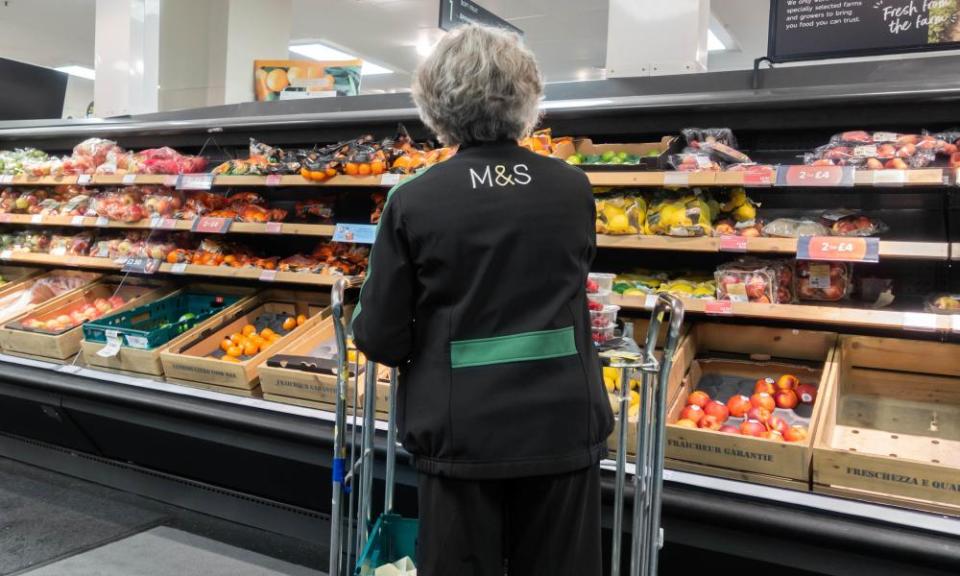Marks & Spencer and Tesco enjoy strong Christmas

Retailers warn of rising prices in months ahead as costs of shipping and raw ingredients increase
Marks & Spencer and Tesco enjoyed a strong Christmas trading period, as the rapid spread of Omicron prompted people to eat and drink more at home instead of heading out to restaurants and pubs.
However both retailers warned of rising prices for shoppers in the months ahead, as costs of shipping and raw ingredients were increasing and supply chain difficulties expected to continue for some months.
“We will continue to see lumps and bumps through the next quarter,” said Steve Rowe, the chief executive of M&S, who said some price rises were inevitable later in the year. “The pressures have come down slightly as we have passed the peak but there are still some issues with shortages of labour and continuing [staff] absence [including at suppliers].”
Tesco said cost inflation was running at about 5%, but it was working closely with suppliers to make efficiencies so that not all of this would be passed on to shoppers.
Increases in pay for workers in stores, warehouses and delivery networks are also expected to rise as amid staffing shortages prompted by Brexit are made worse by absences related to the pandemic.
Tesco and M&S said they would be negotiating with unions and expected to increase pay as rivals including Sainsbury’s, Aldi and Lidl have already pledged to pay more than £10 an hour from this spring.
M&S, which is recovering from years in the doldrums, booked its highest ever sales of food and a surge in clothing. Food sales jumped 10% in the three months to 1 January, compared with a year earlier, making it the fastest growing food retailer in the UK.
The retailer said strong sales of bras, pyjamas, jeans and activewear had spurred on clothing sales, while food sales were boosted by shoppers buying a wider array of everyday items, including tea, easy peeler citrus fruit, milk and cheese. Demand for special items including rosé prosecco, vegetarian and vegan foods and a light-up tin of shortbread biscuits also lifted trade.
“Customers are desperate for great quality merchandise and that’s one of the great things we offer. There is a flight to great value more than necessarily cheap prices,” Rowe said.
The strong rise in sales fat M&S came despite fears of product shortages caused by supply chain difficulties including driver shortages and hold-ups at ports.
Related: M&S and Tesco hail strong Christmas performances, but shares drop – business live
Clothing sales jumped almost 40% in the UK and more than 17% overseas as shoppers were able to return to stores after last year’s widespread lockdowns.
Beyond the year-on-year bounceback, M&S said clothing sales were up 3.2% on 2019 – before the pandemic – despite a 10% fall in sales at its stores, as online trade was just over 50% ahead of two years ago. Food sales were up 12.4% on pre-pandemic levels, not including items sold via Ocado, the online specialist grocery service in which Marks & Spencer owns a 50% stake.
Rowe said: “Trading over the Christmas period has been strong, demonstrating the continued improvements we’ve made to product and value.
“Food has maintained its momentum, outperforming the market over both 12 and 24 months. The market continues to be impacted by the headwinds and tailwinds that we reported in the first half, but I remain encouraged that our transformation plan is now driving improved performance.”
The boost to food retailers from the Omicron wave was also confirmed by Tesco.
The UK’s biggest supermarket said sales rose 0.6% in the three months to 8 January – compared with the same period a year before. Tesco increased sales on 2020 when supermarket sales were boosted by the closure of hospitality businesses for many weeks across the UK.
Ken Murphy, the chief executive of Tesco, said: “Despite growing cost pressures and supply chain challenges in the industry, we continued to invest to protect availability, doubled down on our commitment to deliver great value and offered our strongest ever festive range.
“This put us in a strong position to meet customers’ needs as, once again, Covid-19 led to a greater focus on celebrating at home. As a result, we outperformed the market, growing market share and strengthening our value position.”
Both companies nudged up their forecasts for the full year but investors were underwhelmed. Disappointment about a lack of big profit upgrades andfears over inflation led Tesco shares to fall 2% in early trading on Thursday, while M&S was down 4%.

 Yahoo Finance
Yahoo Finance 